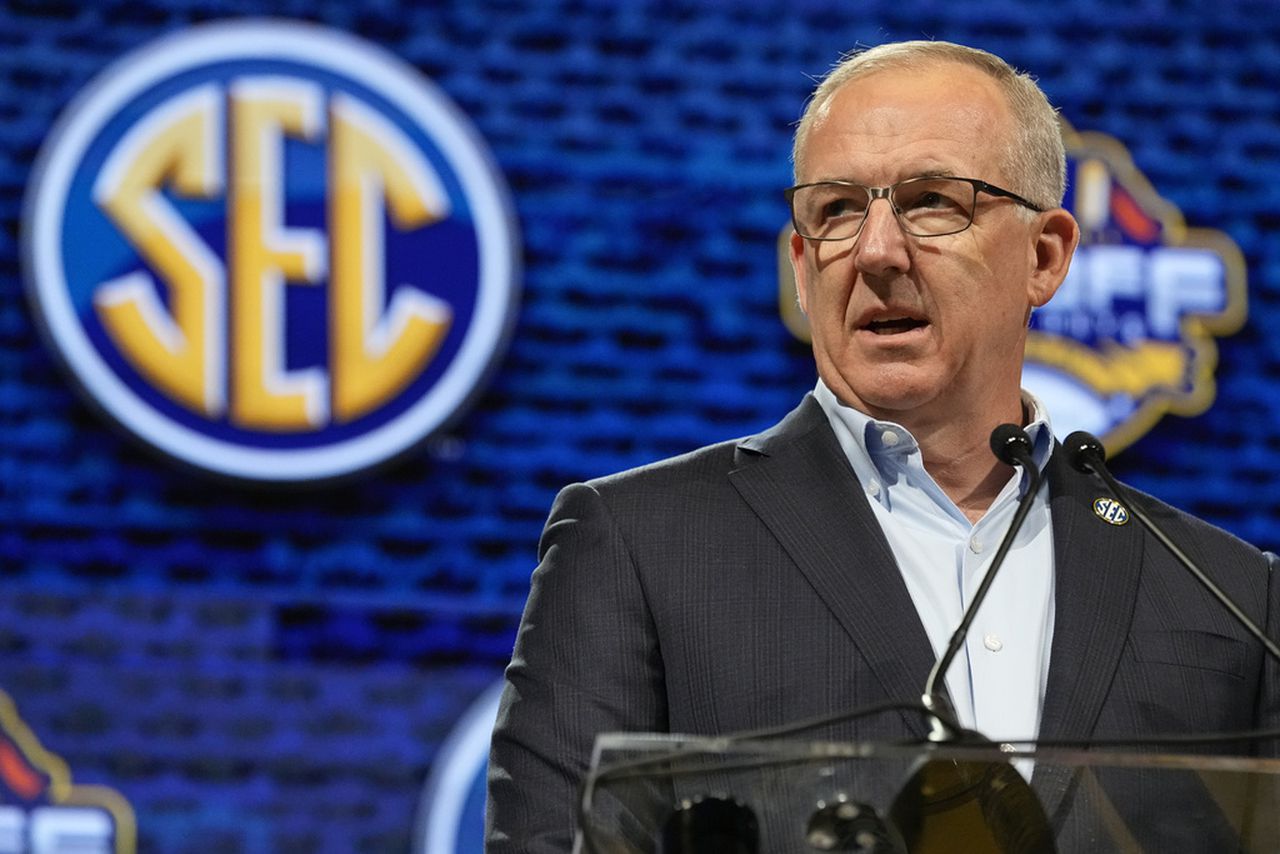SEC Media Days: Greg Sankey points to congress to regulate NIL
When SEC commissioner Greg Sankey took center stage in Nashville Monday — not at the Grand Ole Opry, but the Grand Hyatt — he quickly went off script, offering the announcement that he and his wife became first-time grandparents earlier in the week.
Sankey went on to reflect on the mass shooting that took place in Nashville on March 27, when six people were killed at The Covenant School. He went on to welcome four members of local law enforcement who responded to the tragedy that day.
With a sudden shift, Sankey expressed his grievances with neckties ― a belief he shared with late Mississippi State head coach Mike Leach. In Leach’s honor, Sankey was tie-less Monday.
Sankey’s first moments at center stage were eclectic before settling into his politician-like cadence and diving into the everchanging landscape of college football in the Southeastern Conference, which is set to expand to 16 teams next year with the addition of Oklahoma and Texas.
“As we look forward to the season ahead and the year ahead, it will be our final as a 14-team conference. We’re going to grow to 16 July 1, 2024,” Sankey said. “That’s not news.”
It’s expected this season will be the final featuring a four-team playoff, Sankey added.
But those changes pale in comparison to the change that celebrated its second year in affect on July 1 — the compensation of college athletes for their name, image and likeness.
“I’m going to be as clear as I can. Our activities in Congress or discussions with states and even discussions of conference policies are not about taking away. Not about taking away these new name, image, and likeness opportunities,” Sankey said.
But we all know there are stories — some stories told and others not told — of promises made but not fulfilled, of inducements offered but not provided, of empty commitments of NIL agreements that created more questions than provided answers, and other behaviors in this space that rightly cause concern.”
Many of the issues regarding NIL can be chalked up to the lack of uniformity, Sankey says.
“Our student-athletes want to know their competitors on the opposite line of scrimmage are subject and governed by the same rules and policies by which they are governed,” Sankey said. “Uniformity will ensure a high school student and his or her family do not have to investigate potentially dozens of different state laws or university policies to figure out how they can be active in this name, image, and likeness world.”
In the state of Alabama, for example, lawmakers repealed its NIL law last February after the bill’s sponsor, Rep. Kyle South, said Alabama’s first draft was more restrictive than NCAA guidelines.
Meanwhile, in Mississippi, universities are able to impose reasonable limitations on the dates and times in which student-athletes can sign NIL deals, which must be disclosed to the university before the deal becomes effective.
In Tennessee, an amendment made in April of 2022 allows NIL agents and representatives, which aren’t at all governed by the NCAA, to give presentations on campus to recruits and current players.
“Future student-athletes, those who right now might be 15 or 16 or 17 years old, they deserve something better than to need to sort through a fully unregulated marketplace, being approached by individuals who present themselves as something that they may not be,” Sankey said. “Anyone can purchase card stock and run it through a printer and call themselves an agent on a business card.”
Despite his gripes, Sankey realizes that he and those in the SEC office can’t be the only ones lobbying for change.
Instead, the SEC’s commissioner zeroed in on congress.
In early June, Sankey and 14 representatives from the SEC’s member institutions traveled to Washington D.C. to address NIL issues with members of Congress.
“The reality is only Congress can fully address the challenges facing college athletics,” Sankey said. “The NCAA cannot fix all of these issues. The courts cannot resolve all of these issues. The states cannot resolve all of these issues, nor can the conferences.”
